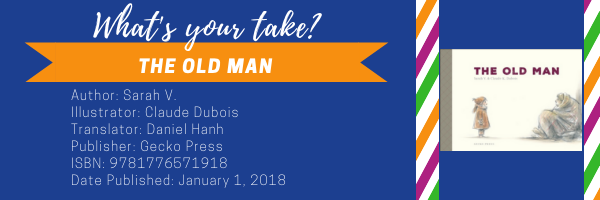By Celeste Trimble, St. Martin’s University, Lacey, WA and María Acevedo-Aquino, Texas A&M University-San Antonio, San Antonio, TX
This month Celeste and María consider stories that examine issues of hunger, poverty and homelessness. In each of the stories, the characters are represented in a dignified and respectful manner. This week, they discuss The Old Man, written by Sarah V., illustrated by Claude K. Dubois and translated Daniel Hanh.

MARÍA: The Old Man, originally published in France, is about a day in the life of a homeless man in the city. The man is cold, tired and hungry. He is neither welcome in the park, nor on the bus. He could go to the shelter, but remembering his name is too hard… easier to leave. He covers himself with his blanket so no one can see him. But the little girl sees him, and the next time he goes to the shelter, he can provide them with a name.
I love how detailed this book is in depicting the details in his man’s life, and how much I am able to see as I read some of the accounts. For example: The old man is thirsty. Apart from the sparrows, he’s the only one who knows how delicious this fountain water is! This book inspired me to be more like Rafael Muñoz (from The Lunch Thief): more conscious about the need to inquire and be informed, not make assumptions about individuals and the situations that might contribute to their current situations, or not assert what “I think” individuals might need.
CELESTE: In many books centered around issues of hunger, there is a (deliberate? unavoidable?) lesson about the importance of empathy. By just opening up our hearts, our wallets, our lunch boxes, compassionate and well-fed people can help those who are hungry. In The Old Man, the little girl provides him with part of her sandwich but also teases him a bit. She calls him funny and says he resembles a teddy bear. This seemingly tender teasing provides him with the name he gives, Teddy. In a sense I enjoy this. It is not only sustenance that is needed by the old man but also a validation of his identity. His memory is such that he remembers being a mail carrier, but he does not remember his name. I read the girl’s gesture as a way of unknowingly humanizing him by referring to him as a stuffed animal. She humanizes him by acknowledging him.
MARÍA: Janelle B. Mathis and Katie Loomis wrote their MTYT on The Old Man. They highlight the importance of not disregarding “the potential of a child to see beyond the surface.” Their observation connects with the four books that we selected for MTYT. For example, in this book, the child sees a human being that she can interact with, perhaps even connect with, though the experience of the teddy bear. In Maddi’s Fridge, Sofia sees Maddi’s friendship over anything else. The Lunch Thief shows that Rafael sees Kevin’s struggles and his need to adapt to new life circumstances rather than focusing on the lunch he took. Next week, when we look at A Different Pond, you will see a reflective child who notices all the small things his parents do to support their family financially and culturally. Our four books show the small gestures that can humanize, from developing awareness to taking action.
CELESTE: The concept of seeing beyond the surface relates to the illustration style as well. The sketch-like illustrations invite us to consider this story visually, but they hesitate to give us a crystal-clear vision. Drawn with watercolor pencil, the predominant color is grey with a delicate yellow on many of the pages. The reader is invited to see beyond the rough lines and indistinct shapes and allow their own imagination to contribute to the story. Not only does the child in the story see beyond the surface of the man experiencing homelessness, but the child immersed in this story is compelled, in a sense, to contribute to and continue the kindness in this story in their own lives.
Author: Sarah V.
Illustrator: Claude K. Dubois
Translator: Daniel Hanh
Publisher: Gecko Press
ISBN: 9781776571918
Date Published: January 1, 2018
Throughout June 2019, Celeste and María give their takes on books that look at hunger, poverty and homelessness. Check back each Wednesday to follow the conversation!
- Themes: Celeste Trimble, Claude K. Dubois, Daniel Hanh, Maria Acevedo-Aquino, Old Man, Sarah V
- Descriptors: Books & Resources, My Take/Your Take
